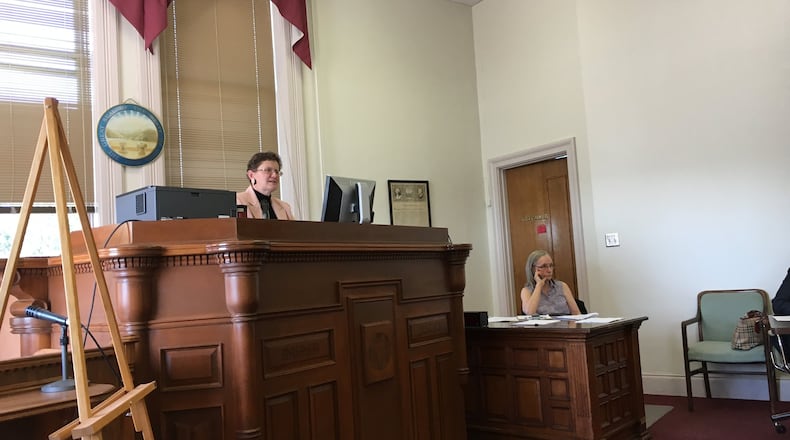The Butler County Juvenile Court, Children Services and mental health board resurrected the court in 2017 — grant funding fizzled for the previous specialty court in 2012 — with the help of a five-year $2.1 million Substance Abuse and Mental Health Services Administration (SAMHSA) federal grant. The grant is expiring at the end of September, and officials are hoping the county commissioners will pick up the bill for the program after that.
Juvenile Court Administrator Rob Clevenger said it will cost about $175,000 to $200,000 for the program coordinator and two recovery support specialists. Juvenile Court Magistrate Pat Wilkerson’s salary and benefits are already paid by the county. He said officials will look for other grant funding but the expiring federal support can’t be extended.
“What those federal grants are really designed to be is kind of seed money, to get you up and running, and then once you realize it’s a valuable service for your local community, you’ll then use local dollars to make that happen,” Clevenger said.
He said it was unusual that Butler County received SAMHSA funding twice for the same program. The county paused the specialty court when the funds evaporated the first time, and it was restarted after too many parents were falling victim to the heroin epidemic, clogging the county’s children services agency.
When the opioid epidemic was raging, too many adoptions were happening because parents faced drug problems Interim JFS Executive Director Julie Gilbert told the Journal-News the problem hasn’t waned.
“Substance continues to be one of the primary reasons why families need intervention from our system,” Gilbert said. “It’s really driven by opioids and methamphetamines, those are the two drugs that we’re seeing the most.”
The program is voluntary and lasts between 12 and 14 months.
In addition to intensive drug treatment programs — largely paid for with Medicaid dollars — the court helps parents wade through legal problems, get and keep jobs, overcome transportation issues and other needs.
One young woman who regained custody of her two children after going through the program told the Journal-News previously she needed the power of the court to finally kick her habits.
“Having the power of a judge that’s on your side, wanting the best for you, not to punish you…” she said was key to her success.
“(The family drug court) was much more involved than just getting clean from drugs,” she told the Journal-News. “It’s healing all the aspects of my life that still needed work … It put more puzzle pieces together than just the drug treatment part of it. If I don’t fix why I’m using I’m just going to keep using.”
The grant was for about $425,000 a year and it covered the three court personnel salaries and “soft costs” like incentives, drug testing, parenting classes and other components, according to Clevenger. He said his main “pitch” to the commissioners will be to cover the salaries, he plans to tap other sources for the rest of the cost.
“I think that’s a critically important project,” Commissioner Cindy Carpenter said. “I feel strong that we should support this family drug court in the future.”
Wilkerson said 89 clients have come through her specialty court, not all of them have succeeded on their road to sobriety but she believes she has helped all of them.
“The program is vital to these families, these are some of the families at the highest risk and highest need levels,” Wilkerson said. “I truly feel a good number of them could not be successful without our intervention. I think most of them would say that. Most of the people who do not successfully complete our program do not reunify with their children.”
About the Author

